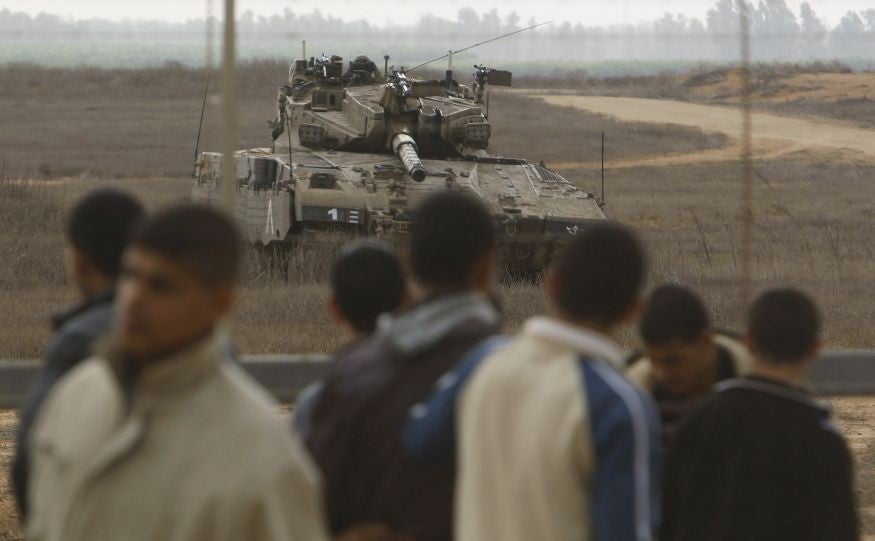Major test for ceasefire after Israeli troops shoot farmer dead and wound twenty others
Farmer killed amid confusion over ceasefire

Anwar Abdelhadi Quiedh became the first ‘martyr’ of peacetime Gaza today, shot dead by Israeli troops who also wounded 20 others, leading to protests by Palestinians and posing a significant test of the ceasefire signed just 36 hours previously.
Mr Quiedh was in a group of 300 men, most of them farmers, who had moved into fields near the border after hearing on radio and television that the peace deal allowed them to reclaim land which had been declared a buffer zone by the Israelis.
It is indeed the case that the accord signed in Cairo to end the latest conflict provides for Palestinian farmers to cultivate the stretches along the frontier and fishermen to take their catches in waters from where they have been hitherto banned.
But exactly when these measure are to be implemented remains unclear - as 21 year old Mr Quiedh and the other casualties found out to their cost.
The shooting led to a second incursion by youths towards the border fence, some of them shouting “Allah-hu-Akhbar” and the name of the Egyptian president “Morsi, Morsi” as they ran forward. They dispersed after Israeli troops fired in the air.
Tonight demonstrations were being held in the villages in the area with calls for Hamas and militia groups to retaliate against what the residents were adamant was a clear breach of the ceasefire agreement.
Tonight Hamas policemen were turning away people the contentious field and the of an Islamist Brigade battalion at the nearby town of Khan Yunis said he has received no orders to resume hostilities.
But Commander Abu Mousa of the Balad brigade added “This is the second time the Israelis had breached the ceasefire and this there has been a death and people wounded. We are here to protect the people and if this continues surely we must act.”
Rasmia Quiedh, the bereaved mother of the young dead farmer, had no doubt about what should be done. Sitting in mourning surrounded by female relations and neighbours, she told The Independent “There must be revenge for my son. Hamas have been saying how strong they are. Well, let them show it. The agreement said we could go back to use our land and the Israelis are shooting people for doing that.
“Most of our best land is now lost in Israel. My husband grew olives on the land on this side [of the border]. It is now lying empty but we can’t do anything with it; we have to live on aid from foreigners. I am very sad for my son but I am also proud of him, he was standing up for our rights.”
What added to the sense of shock among the farmers was that the shooting took place on the second day they had ventured on to the fields. A six hour foray on Thursday, during which they cleared some of the area resulted in the Israelis firing in the air, but nothing more.
Mahmoud Abu-Taieb was too apprehensive to make the first journey; but he went along today at the urging of others. By the afternoon he was lying on a bed at the Nasar Hospital in Khan Yunis with bullet wounds to his hip and abdomen.
“My uncle and his friends asked me to go along with them. They said nothing happened to those who went on the first trip and, anyway, it has been announced on TV that we were allowed to go. I could not refuse, we have so little money, this was a chance to start doing something with our farm again.”
Mr Abu-Taieb said the shooting started within half-an-hour of him getting to the fields. “I was sitting down talking. I swear we were 300 meters from the border. Some Israeli soldiers got out of jeeps and I could hear someone shouting something through a loudspeaker in Hebrew. Then they started firing, first on the ground, then straight at us.
“I felt pain in my stomach, I looked down and there was a lot of blood everywhere. People were frightened and they had run away. I started crawling back, but they were still shooting, I could hear the bullets over me. When I reached the others, I just collapsed.”
The size of the buffer zone had varied in the various twists of the relationship between Israel and the Palestinians. Mohammed Emawi last set foot on the family farmland 12 years ago with his father; he went back today with his 30 year old brother and was another one to be injured, shot in the stomach. “It said on TV that we can go back and that’s why we went” he said. “I was about 150 meters from the fence, they opened fire and I was hit; I woke up later in the ambulance.”
The Israeli army stated last night that around 300 Palestinians had approached the security fence at several points in southern Gaza, trying to damage it and cross into Israel. Soldiers had fired warning shots in the air, but after the crowd refused to move back, fired at their legs.
Subscribe to Independent Premium to bookmark this article
Want to bookmark your favourite articles and stories to read or reference later? Start your Independent Premium subscription today.

Join our commenting forum
Join thought-provoking conversations, follow other Independent readers and see their replies